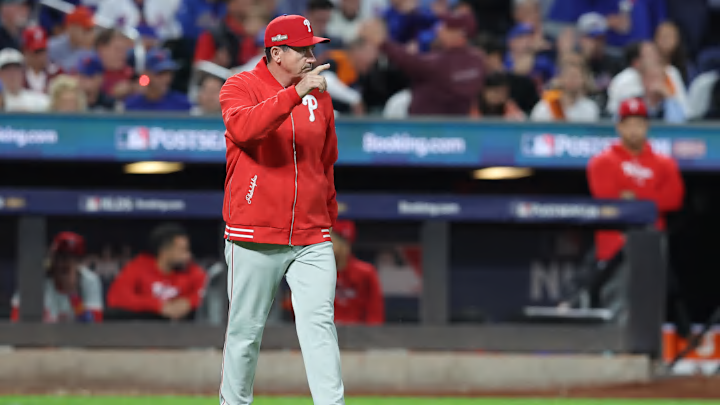It was truly a disappointing showing by the Philadelphia Phillies, to say the least, in the 2024 NLDS against the New York Mets. Who would have predicted that the Phillies’ bats would suddenly go ice cold while their trusted bullpen would implode at the worst possible time?
As much as the blame should be on the players for not performing, there were certainly some questionable calls by manager Rob Thomson during the series that may have ultimately led to the team's undoing. He'll surely be evaluated in the front office's post-mortem on the season. He still has one more year on his contract, and while some fans want to see Thomson gone, it's hard to imagine him not returning.
Let’s take a closer look at four mistakes made by the Phillies manager that ended up costing the team the NLDS.
4 mistakes Rob Thomson made that cost the Phillies the NLDS
Ace Zack Wheeler wasn’t used in the do-or-die Game 4
When the entire season is on the line, a team should do anything they can to make sure that they give themselves the best chance at winning. If the Phillies were to go down, they should go down with their best. With that in mind, Thomson should have taken the unconventional route and given the ball to ace Zack Wheeler on short rest in Game 4 of the NLDS.
There was no doubt that he probably wouldn’t have been able to repeat the dominant seven innings of one-hit, shutout masterpiece from Game 1. But knowing that Wheeler always does his best in the biggest games, he would have provided more stability and length for the Phillies than what Game 4 starter Ranger Suárez did. It would have minimized the usage of their unstable bullpen, which ultimately gave the game away as a result.
If the Phillies did still end up losing as a result, at least they tried with the best that they had with no regrets.
Benching Bryson Stott following one of the biggest games of his life
When someone suddenly has the hot hand, they should be rewarded for their efforts. After struggling for the bulk of the season, pretty much from June onwards, Bryson Stott had perhaps the biggest game of his life in Game 2. In the most crucial junction of the game, he came through with a clutch two-run triple to put the Phillies ahead at the time, in which they ultimately won 7-6.
Rather than riding that momentum while it was at an all-time high, Stott never got the chance to do so as he was relegated to the bench to start Game 3 due to matchups. By the time he was inserted back in the lineup for Game 4, all of his built-up fire fizzled, and he went hitless. Going with analytics and by the numbers may work out sometimes, but in some cases, Thomson should just go with the gut feeling that could have worked out even better.
